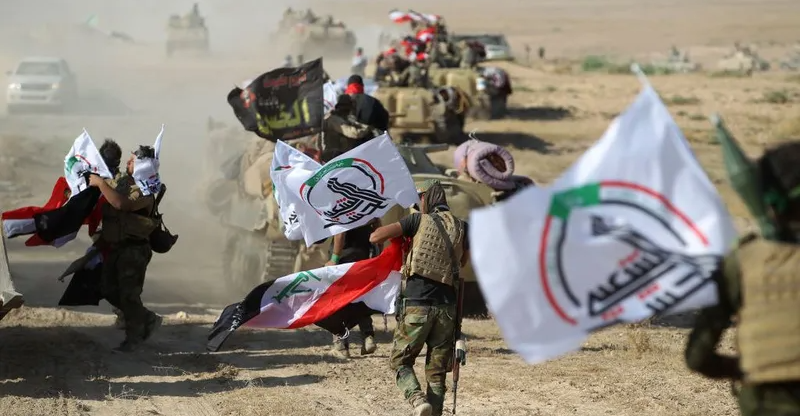
Shafaq News
As Iraq’s parliamentary term draws to a close, a controversial
draft law to restructure the Popular Mobilization Forces (PMF) has reignited a
complex political battle that reaches far beyond its military implications.
While the Shiite-led Coordination Framework seeks to secure formal
legal status for the PMF within the national defense architecture, internal
divisions, Kurdish-Sunni bargaining, and mounting US opposition have turned the
bill into a flashpoint at the heart of Iraq’s statehood debate.
The Political Stakes Behind the PMF Law
The proposed PMF Authority Law, backed by major Shiite factions,
is officially framed as part of Iraq’s ongoing security reform. It aims to
integrate the PMF—a force originally formed to fight ISIS—into the military
chain of command. Supporters argue the law is necessary to standardize ranks,
regulate funding, and clarify the PMF’s relationship with state institutions.
But opponents—both foreign and domestic—view it as an attempt to
legitimize powerful Iran-aligned factions and institutionalize a parallel
command structure, insulated from civilian oversight.
The controversy reflects deeper struggles over the nature of the
Iraqi state: whether it will consolidate authority through a unified military,
or evolve toward a pluralistic security system shaped by competing political
and paramilitary actors.
Legal Background and Structural Gaps
The PMF was formed in mid-2014 by government order in response to
Grand Ayatollah Ali al-Sistani’s fatwa (al-jihad al-kafa’i) after the fall of
Mosul. It drew tens of thousands of fighters, including from pre-existing armed
factions. In 2016, Iraq’s parliament passed the first PMF law, formally
recognizing the force—but leaving its command structure and internal regulation
vague.
The current draft law, which has faced repeated delays, seeks to
address those gaps. According to parliamentary sources, the amendments propose:
-Military ranking and formal structures.
-Defined administrative ties to the Ministries of Defense and
Finance.
-An internal inspectorate for discipline and oversight.
-Military background requirements for PMF leadership.
-Formation of internal military councils.
-Unique financial entitlements for specific units.
Yet critics argue that the draft preserves the PMF’s
administrative independence while cementing legal protections for its
leadership—effectively creating a parallel army.
Fragmented Support Within Iraq’s Parliament
While Coordination Framework blocs hold significant parliamentary
sway—especially after the 2022 resignation of Sadrist MPs—consensus on the PMF
law remains elusive. Internal rifts, even among Shiite factions, center on
leadership appointments and control over PMF deployments in Sunni-majority
areas.
Kurdish and Sunni lawmakers, while less vocal in public, have
played a pivotal behind-the-scenes role in blocking the bill. During the July
session, both blocs withdrew in protest over the bill’s inclusion on the
parliamentary agenda. Their objections were procedural and political: citing
Article 37 of the parliamentary rules, they argued the bill was added without
proper notice, while also using the walkout to apply pressure on broader
negotiations.
Some Kurdish factions, according to Shafaq News political sources,
have linked their support for the PMF law to concessions on unresolved
federal-regional disputes, including budget allocations, oil revenues, and
control of border crossings. Messages were reportedly sent through
intermediaries outlining these conditions for cooperation on “controversial
legislation.”
Sunni parties are also split. Most are in favor of not passing the
bill most notably former Speaker Mohammed al-Halbousi’s Taqaddum Coalition (37
seats), which has voiced reservations tied to influence distribution and
executive authority.
Observers note that both Kurdish and Sunni leaders fear the law
may consolidate what they see as a “Shiite army” with disproportionate
influence—yet are equally motivated by the opportunity to extract political
gains in return for their votes.
With Kurdish and Sunni MPs holding over 120 of 329 seats, their
coordinated opposition could block passage, despite the Coordination
Framework’s control of at least 130 seats. The ambiguous positions of
independents and small parties further complicate the math, making consensus
difficult.
US Pressure and Strategic Alarm
The United States has expressed firm and repeated opposition to
the PMF law. Pentagon officials told Shafaq News they view the draft as a
direct enhancement of Iran’s influence in Iraq. The US Embassy in Baghdad
echoed this stance, with Chargé d’Affaires Steven Fagin warning that the
legislation risks legitimizing groups the US classifies as terrorist
organizations.
Secretary of State Marco Rubio, in a call with Prime Minister
Mohammed Shia al-Sudani, warned that the law would institutionalize
Iranian-backed armed groups and undermine Iraqi sovereignty. This message was
reiterated in a State Department statement, which called the law “deeply
concerning.”
A report by the Washington Institute for Near East Policy argued
that the US would respond by sanctioning PMF leaders with ties to Iran,
freezing components of the US-Iraq security partnership, or conditioning
military aid on security-sector reforms.
Despite the US warnings, the Iraqi government has stood by its
position. A statement from al-Sudani’s office described the bill as a sovereign
initiative consistent with previous legislation for other agencies, such as the
Intelligence and National Security Services. The PMF, it stated, is a “formal
military institution operating under the Commander-in-Chief (PM al-Sudani).”
Independent Voices, Strategic Fears
Former Iraqi diplomat Dr. Ghazi Faisal told Shafaq News that the
PMF law is evolving from a regulatory tool into a “ticking political bomb.” He
cautioned that enshrining the PMF’s autonomy would fracture the military
command hierarchy and facilitate dual loyalties within Iraq’s security system.
Faisal warned that unless a national consensus is reached, the law
could trigger a serious confrontation with Washington and contribute to the
erosion of centralized authority. “We risk institutionalizing a force whose
chain of command is not fully loyal to the state.”
Efforts by Shafaq News to solicit formal comments from major
Kurdish and Sunni parties were met with silence. Spokespersons declined to give
on-record positions, noting only that “all matters will be resolved legally
within parliament through dialogue.”
Government in the Crossfire
Political analysts interviewed by Shafaq News say Prime Minister
al-Sudani is walking a tightrope. On one hand, his administration is beholden
to the Coordination Framework’s legislative agenda. On the other, it seeks to
avoid antagonizing Washington at a time when Iraq remains economically fragile
and engaged in sensitive IMF and financial negotiations.
Strategic expert Ahmed al-Yasiri noted that the US views the PMF
law as part of a larger regional contest for influence. The fear is that
codifying PMF independence will entrench a legislative precedent that future
governments cannot undo.
Between Passage and Paralysis
Shafaq News has learned from informed sources that US diplomatic
efforts to halt the law remain active. While the draft may still be revived in
a future session, its fate now depends on a complex equation: intra-Shiite
cohesion, Kurdish and Sunni leverage, and the extent to which foreign pressure
can shape Iraq’s legislative agenda.
Ultimately, the PMF law has become a symbol of Iraq’s unresolved
struggle between the logic of a unified state and the reality of competing
armed power centers.
Written and edited by Shafaq News staff.





